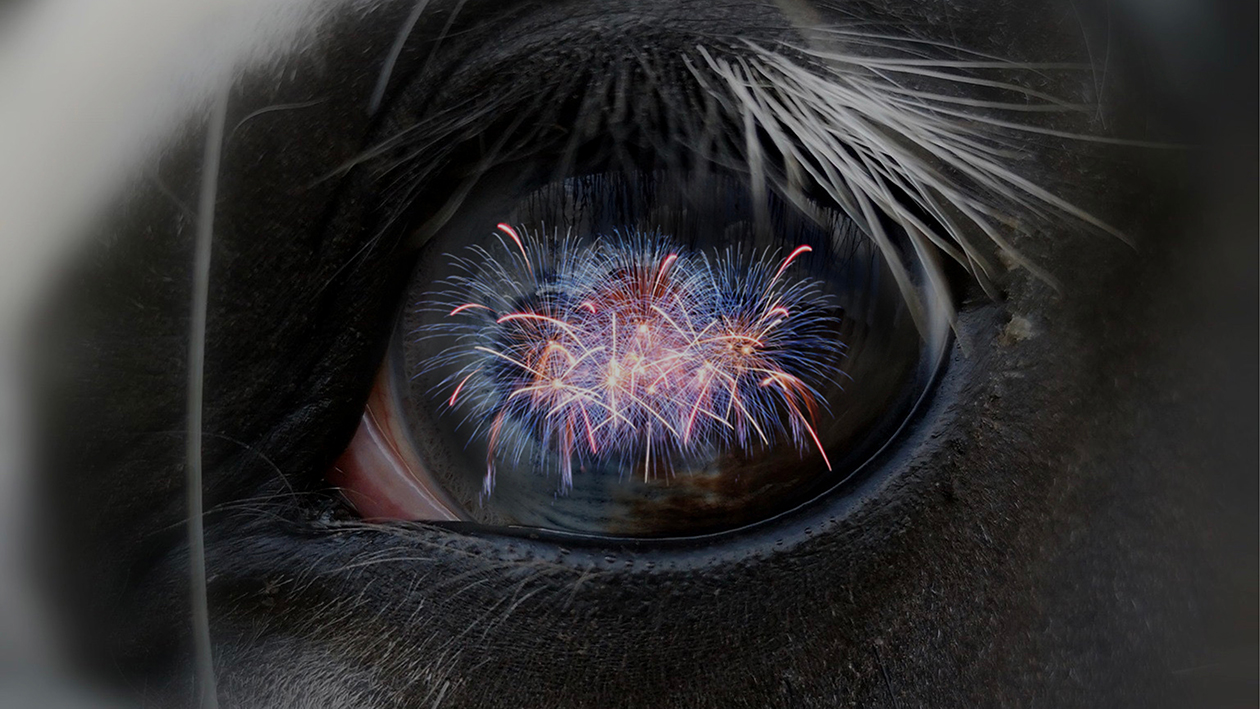Bonfire Night and firework displays are usually a time of fun and excitement. However, for many animals and their owners, November 5 can be a nerve-wracking experience as explosions, fire and flashing lights terrify many equines.
We have written this handy guide to help horses, their owners and event organisers have a happy and relaxed bonfire night. Our top tips are here to give you a helping hand and guide you through what can be a challenging time of year.
Horses are flight animals
Before we go into more detail, it’s really important to understand the reasons behind an equine’s seemingly erratic behaviour around Bonfire Night and why they become so frightened. All horses, ponies, donkeys and mules are flight animals, which means when they are scared, say by the loud noises and bright lights of fireworks – their instinct is to run away. When they are unable to do this, horses will become stressed and unpredictable. When horses are in flight mode they often panic and this is when injury to both horses and humans can occur.
How can owners help to keep their horses safe?
1) All horses thrive on routine and any change in this can lead to anxiety and stress. By providing a safe, secure environment and keeping to the same management routine, this can help reassure your equine during this period.
2) If your horse is being stabled it can be a good idea to leave the lights on and play the radio to help drown out the effects of the fireworks. This routine should be introduced in advanced and radio licensing laws will need to be considered by commercial yards or businesses.
3) Plan for unforeseen circumstances:
- Fire – create an evacuation plan to ensure both horses and humans can safely escape a fire.
- Escape – if your horse escapes, contact the police and obtain an incident number. Keep a recent photo and horse identification documents to hand for this purpose.
- Injury – ensure your first aid kit and materials are fully stocked. Keep emergency vet details so they are easy to access.
- Accident/damage – most horse owners already have third party and liability insurance. It is advisable to purchase as it will protect you and your horse, should your equine cause an accident or damage to property of others. The British Horse Society has launched a new app where horse related incidents and accidents can be logged, Find out more here.
- Check locally for scheduled displays – contact the organisers to see if the displays can be directed away from the equine environment. The organisers will also be able to advise of the timetable so you know when to be on alert.
- If you know your horse is exceptionally sensitive to fireworks and associated stress, contact your vet and seek advice.
How can firework / bonfire organisers help?
- Clearly advertise the event. If you can, try letting local horse owners know when the displays are scheduled. This can be really helpful as it allows the owners to make plans to ensure their animal is kept safe and stress-free.
- Think about directing the displays away from known animal homes. This can potentially reduce the impact of the noise and light pollution.
- The Animal Welfare Act 2006 states it is an offence to cause any unnecessary suffering to any captive or domestic animal. Government advice is – fireworks must not be set off near livestock or horses in fields or close to buildings housing livestock.
How can everyone help?
- Attend organised events rather than creating your own display. If you’re planning to have a display, try to use low noise fireworks – those that create a visual effect but are quieter or produce no bang.
- If you’re planning your own display, let any local animal owners know what day and time you are hoping to hold your display so they can make preparations to settle their equines.
- If you come across a horse in distress, it is not advisable to approach it. They can be unpredictable and could cause an accident or injuries. Wherever possible contact the owner and allow them to manage the situation. If a horse has escaped and is loose on the road, contact the police for assistance.
Follow and share these top tips to reduce the stress felt by both animals and their owners this Bonfire Night.

